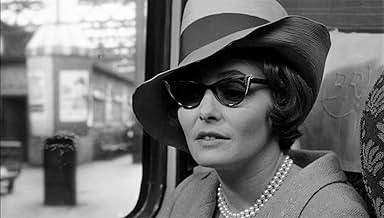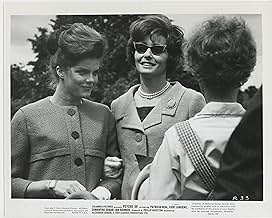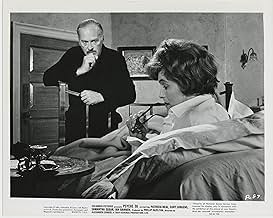Aggiungi una trama nella tua linguaIn London, the pregnant wife of an industrialist falls down the stairs, loses her sight and has no recollection of the events but suspects that a mentally traumatic experience prior to the f... Leggi tuttoIn London, the pregnant wife of an industrialist falls down the stairs, loses her sight and has no recollection of the events but suspects that a mentally traumatic experience prior to the fall caused her accident.In London, the pregnant wife of an industrialist falls down the stairs, loses her sight and has no recollection of the events but suspects that a mentally traumatic experience prior to the fall caused her accident.
- Regia
- Sceneggiatura
- Star
- Nominato ai 1 BAFTA Award
- 1 candidatura in totale
Curd Jürgens
- Eric Crawford
- (as Curt Jurgens)
Rex Garner
- Waiter
- (non citato nei titoli originali)
Pat Hagan
- Diner in Restaurant
- (non citato nei titoli originali)
Victor Hagan
- Diner in Restaurant
- (non citato nei titoli originali)
Aileen Lewis
- Lady in Teashop
- (non citato nei titoli originali)
Edward Malin
- Attendant in Men's Room
- (non citato nei titoli originali)
Jack Mandeville
- Man Exiting Lift
- (non citato nei titoli originali)
Louis Matto
- Waiter
- (non citato nei titoli originali)
Recensioni in evidenza
I am admittedly biased after seeing her in "The Subject Was Roses", an incredible achievement by Patricia Neal. That being said, this film "Psyche 59" deals with Neal and her seemingly caring husband Curd Jurgens (always believable as middle-aged man, malcontent).
The story starts with Neal in her comfortable London town home, where she is blind due to a tragic accident five years earlier. Her sister Robin (Samantha Eggar) comes to stay with her, which for some reason annoys Jergens. We see the reason clearly as the film unwraps, Eggar's personality as she flirts with her sister's husband. It is rather hard to believe the storyline here that Robin (Eggar) is 17 in this film, as she looks to be about 30 in real life, and manner.
If you can suspend the disbelief a bit (Eggar becomes shrill and annoying at the end, attempting to gain attention from Curt Jurgens).
They stay at the grandmother's country estate for a beach vacation, and the grandmother is , as another reviewer mentioned, rather an extraneous character and its puzzling as to why she has been included in the film, even.
Overall though while the story moves slowly at some points, keep watching for Patricia Neal. She saves the storyline and makes the film well worth your time. Recommended.
The story starts with Neal in her comfortable London town home, where she is blind due to a tragic accident five years earlier. Her sister Robin (Samantha Eggar) comes to stay with her, which for some reason annoys Jergens. We see the reason clearly as the film unwraps, Eggar's personality as she flirts with her sister's husband. It is rather hard to believe the storyline here that Robin (Eggar) is 17 in this film, as she looks to be about 30 in real life, and manner.
If you can suspend the disbelief a bit (Eggar becomes shrill and annoying at the end, attempting to gain attention from Curt Jurgens).
They stay at the grandmother's country estate for a beach vacation, and the grandmother is , as another reviewer mentioned, rather an extraneous character and its puzzling as to why she has been included in the film, even.
Overall though while the story moves slowly at some points, keep watching for Patricia Neal. She saves the storyline and makes the film well worth your time. Recommended.
Françoise des Ligneris's novel "Psyche '59" becomes a fine dramatic vehicle for the always-sympathetic Patricia Neal, here playing the wife of a wealthy businessman who is suffering from 'hysterical blindness' after a mysterious fall; when sister Samantha Eggar comes to live with her after a failed attempt at marriage, years-old tensions (both resentful and sexual) between Eggar and brother-in-law Curt Jurgens rise to the surface. As photographed in glossy black-and-white by the esteemed Walter Lassally, the picture is a shiny, classy piece of goods, yet director Alexander Singer takes an awfully long time to warm up. The plot (or rather, the point inherent to the plot) doesn't make itself known for at least an hour into the proceedings, while the pretty images and visual tricks eventually become a nuisance. Singer doesn't appear to wrap things up cohesively with his finale, yet it's actually his best bit: Neal's mental handicap and Eggar's need to be the proverbial thorn in the rosebush are dealt with in solely visual terms, and the silent emotions released are triumphant. A near-miss, but worthwhile for fans of psychological melodramas verging on soap opera. **1/2 from ****
"Psyche '59" opened at an art theatre in New York City in 1964. Receiving lukewarm reviews, it closed quickly, and was then used as a co-feature in neighborhood theatres. I consider it a near-masterpiece. Starring Patricia Neal, Curt Jurgens, and Samantha Eggar, it is a spellbinding study of a woman suffering from hysterical blindness, her sex addict husband, and her younger sister, who it seems was sexually imposed-upon at a young age, and who is both cruelly nymphomaniacal and masochistic as a result. This film was clearly ahead of its time.
The screenplay by Julian Zimet, from a novel by Francoise des Ligneris, is a finely-nuanced piece of work.
Alexander Singer might be considered a great director of films about women's issues, as well as a great director of actresses. Consider his direction of Lola Albright in "A Cold Wind in August" three years before, and his direction of Lana Turner in "Love Has Many Faces" the year following. The fact that all three of these films were failures is clearly the reason why Singer is not widely known ("Love Has" having failed simply because its critics and audiences could not appreciate its deliberately melodramatic style).
The cinematography in "Psyche '59" is outstanding. One shot, in which the camera manages to look upward towards Samantha Eggar, while she is lying on the sand, took my breath away. Within the context of the scene, this use of strange camera angle was intensely effective, and not at all pretentious. Whether it was Singer's idea, or that of cinematographer Walter Lassally, I guess I'll never know.
The only flaw in "Psyche '59" is that the actress in the role of the grandmother seems too young for the part.
The screenplay by Julian Zimet, from a novel by Francoise des Ligneris, is a finely-nuanced piece of work.
Alexander Singer might be considered a great director of films about women's issues, as well as a great director of actresses. Consider his direction of Lola Albright in "A Cold Wind in August" three years before, and his direction of Lana Turner in "Love Has Many Faces" the year following. The fact that all three of these films were failures is clearly the reason why Singer is not widely known ("Love Has" having failed simply because its critics and audiences could not appreciate its deliberately melodramatic style).
The cinematography in "Psyche '59" is outstanding. One shot, in which the camera manages to look upward towards Samantha Eggar, while she is lying on the sand, took my breath away. Within the context of the scene, this use of strange camera angle was intensely effective, and not at all pretentious. Whether it was Singer's idea, or that of cinematographer Walter Lassally, I guess I'll never know.
The only flaw in "Psyche '59" is that the actress in the role of the grandmother seems too young for the part.
Patricia Neal is a blind married woman, who's a victim of hysterical blindness, a term for blindness that is caused by psychological reasons, instead of anything really wrong with the eyes. It seems she was traumatized by something and refused to see things the way they really were. By way of how she relates to sister Samantha Eggar and husband Curt Jurgens, we enter her world. I read one review of this movie that called it turgid. I was never sure what turgid meant. And. sometimes the dictionary only tells you a synonym type of definition, with not enough of an explanation. But if turgid means to tell a story with exaggeration instead of subtlety. Then, I would agree to an extent, but I think this type of film, the story itself, the mood and setting, and its way of telling the story all go well together, up to a point. Things certainly get worse, before they get better. But I liked Ms. Neal's performance (as usual) and I particularly liked the ending, instead of getting a startling and shocking climax which the film feels like it's heading for. It may not be much on the whole, but I would watch this over and the family dynamic and dysfunction only adds to its appeal as a curiosity piece for the Patricia Neal fans.
Obviously based on a novel (and on a novel by a woman too). I saw this film on TV forty years ago and remembered only the menacing conversation the heroine has with her mother, but that was sufficient to make me want to take another look at it again.
Having enjoyed enormous critical acclaim a couple of years earlier with 'A Cold Wind in August', Alexander Singer blew all the clout he'd gained with that freak success in this elaborate, breaktakingly pretentious folly about the love lives of the fabulously wealthy; and found himself condemned to spend the rest of his career in television. But 'Psyche 59' has awarded him the last laugh, it exists.
A weird hybrid of 'The Miracle Worker' and 'The Pumpkin Eater' (both of which ironically starred Anne Bancroft, who replaced Patricia Neal when she nearly died following a series of debilitating strokes while filming '7 Women' in 1965, barely a year after she'd won an Oscar for 'Hud'). Had Ms Neal died this film would probably be better remembered today, and it would certainly make it an even more vivid experience to watch than it already is. She wears a succession of fabulous outfits devised by Julie Harris plus a pair of those chic sunglasses that blind people always do in the movies, the photography by Walter Lassally is stunning, and the restless score by Kenneth V. Jones creates a similar mood to that his music lent soon afterwards to Roger Corman's 'The Tomb of Ligeia'.
Definitely a film to be watched at least once.
Having enjoyed enormous critical acclaim a couple of years earlier with 'A Cold Wind in August', Alexander Singer blew all the clout he'd gained with that freak success in this elaborate, breaktakingly pretentious folly about the love lives of the fabulously wealthy; and found himself condemned to spend the rest of his career in television. But 'Psyche 59' has awarded him the last laugh, it exists.
A weird hybrid of 'The Miracle Worker' and 'The Pumpkin Eater' (both of which ironically starred Anne Bancroft, who replaced Patricia Neal when she nearly died following a series of debilitating strokes while filming '7 Women' in 1965, barely a year after she'd won an Oscar for 'Hud'). Had Ms Neal died this film would probably be better remembered today, and it would certainly make it an even more vivid experience to watch than it already is. She wears a succession of fabulous outfits devised by Julie Harris plus a pair of those chic sunglasses that blind people always do in the movies, the photography by Walter Lassally is stunning, and the restless score by Kenneth V. Jones creates a similar mood to that his music lent soon afterwards to Roger Corman's 'The Tomb of Ligeia'.
Definitely a film to be watched at least once.
Lo sapevi?
- QuizOriginally announced as Dana Wynter vehicle (in the Patricia Neal role).
- Citazioni
Mrs. Crawford: I'll read us another chapter of "The Red Sands of Mars."
- ConnessioniFeatured in Come to Silence with Samatha Eggar (2019)
I più visti
Accedi per valutare e creare un elenco di titoli salvati per ottenere consigli personalizzati
- How long is Psyche 59?Powered by Alexa
Dettagli
- Data di uscita
- Paese di origine
- Lingue
- Celebre anche come
- Das Verlangen
- Luoghi delle riprese
- Shepperton Studios, Studios Road, Shepperton, Surrey, Inghilterra, Regno Unito(studios: made at Shepperton Studios, England)
- Azienda produttrice
- Vedi altri crediti dell’azienda su IMDbPro
- Tempo di esecuzione1 ora 34 minuti
- Colore
- Proporzioni
- 1.66 : 1
Contribuisci a questa pagina
Suggerisci una modifica o aggiungi i contenuti mancanti















